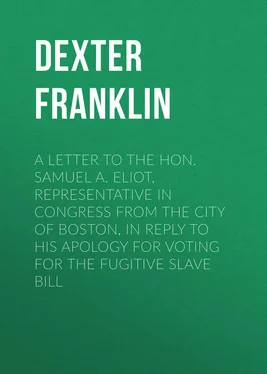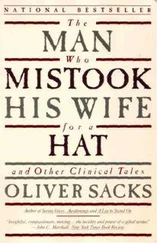Franklin Dexter - A Letter to the Hon. Samuel A. Eliot, Representative in Congress From the City of Boston, In Reply to His Apology For Voting For the Fugitive Slave Bill
Здесь есть возможность читать онлайн «Franklin Dexter - A Letter to the Hon. Samuel A. Eliot, Representative in Congress From the City of Boston, In Reply to His Apology For Voting For the Fugitive Slave Bill» — ознакомительный отрывок электронной книги совершенно бесплатно, а после прочтения отрывка купить полную версию. В некоторых случаях можно слушать аудио, скачать через торрент в формате fb2 и присутствует краткое содержание. Жанр: foreign_antique, foreign_prose, на английском языке. Описание произведения, (предисловие) а так же отзывы посетителей доступны на портале библиотеки ЛибКат.
- Название:A Letter to the Hon. Samuel A. Eliot, Representative in Congress From the City of Boston, In Reply to His Apology For Voting For the Fugitive Slave Bill
- Автор:
- Жанр:
- Год:неизвестен
- ISBN:нет данных
- Рейтинг книги:5 / 5. Голосов: 1
-
Избранное:Добавить в избранное
- Отзывы:
-
Ваша оценка:
- 100
- 1
- 2
- 3
- 4
- 5
A Letter to the Hon. Samuel A. Eliot, Representative in Congress From the City of Boston, In Reply to His Apology For Voting For the Fugitive Slave Bill: краткое содержание, описание и аннотация
Предлагаем к чтению аннотацию, описание, краткое содержание или предисловие (зависит от того, что написал сам автор книги «A Letter to the Hon. Samuel A. Eliot, Representative in Congress From the City of Boston, In Reply to His Apology For Voting For the Fugitive Slave Bill»). Если вы не нашли необходимую информацию о книге — напишите в комментариях, мы постараемся отыскать её.
A Letter to the Hon. Samuel A. Eliot, Representative in Congress From the City of Boston, In Reply to His Apology For Voting For the Fugitive Slave Bill — читать онлайн ознакомительный отрывок
Ниже представлен текст книги, разбитый по страницам. Система сохранения места последней прочитанной страницы, позволяет с удобством читать онлайн бесплатно книгу «A Letter to the Hon. Samuel A. Eliot, Representative in Congress From the City of Boston, In Reply to His Apology For Voting For the Fugitive Slave Bill», без необходимости каждый раз заново искать на чём Вы остановились. Поставьте закладку, и сможете в любой момент перейти на страницу, на которой закончили чтение.
Интервал:
Закладка:
Franklin Dexter
A Letter to the Hon. Samuel A. Eliot, Representative in Congress From the City of Boston, In Reply to His Apology For Voting For the Fugitive Slave Bill
A LETTER, &c
Sir; —
An English courtier procured a colonial judgeship for a young dependant wholly ignorant of law. The new functionary, on parting with his patron, received from him the following sage advice, – "Be careful never to assign reasons, for whether your judgments be right or wrong, your reasons will certainly be bad." You have cause to regret that some friend had not been equally provident of your reputation, and intimated that it was only expected of you to vote for Mr. Webster's measures, but by no means to assist him in vindicating them. You did, indeed, vote precisely as those who procured your nomination intended you should; yet, on your return home, you found your name had become a byword and a reproach in your native State. Another election approached, but you declined submitting your recent course to the judgment of the electors, and withdrew from the canvass. But although the people were thus prevented from voting against you, they persisted in speaking and writing against you. Anxious to relieve yourself from the load of obloquy by which you were oppressed, in an evil hour you rashly appealed to the public through the columns of a newspaper, and gave the "reasons" of your vote for the Fugitive Slave Law. You had a high and recent example of the kind of logic suited to your case. You might have indulged in transcendental nonsense, and talked about the climate, soil, and scenery of New England and the wonders of physical geography, and, assuming that negroes were created free, you might have contended that, in voting for a law to catch and enslave them, you had avoided the folly of reënacting the law of God. Reasons of this sort, you and others had declared, "had convinced the understanding and touched the conscience of the nation." Instead of following an example so illustrious and successful, you assign "reasons" so very commonplace, that the most ordinary capacity can understand them, and so feeble, that the slightest strength can overthrow them.
Your first "reason" is, that the delivery of fugitives is a constitutional obligation. By this you mean, that, by virtue of the construction of a certain clause in the Constitution by the Supreme Court, Congress has the power to pass a law for the recovery of fugitive slaves. Well, Sir, does this constitutional obligation authorize Congress to pass any law whatsoever on the subject, however atrocious and wicked? Had you voted for a law to prevent smuggling, in which you had authorized every tide-waiter to shoot any person suspected of having contraband goods in his possession, would it have been a good "reason" for such an atrocity, that the collection of duties was "a constitutional obligation"? You are condemned for voting for an arbitrary, detestable, diabolical law, – one that tramples upon the rights of conscience, outrages the feelings of humanity, discards the rules of evidence, levels all the barriers erected by the common law for the protection of personal liberty, and, in defiance of the Constitution, and against its express provisions, gives to the courts the appointment of legions of slave-catching judges. And your "reason" for all this is, that the delivery of fugitives is "a constitutional obligation"! The "obligation" is not in issue. Please to understand, Sir, that it is not denied. It is for the manner in which you profess to have discharged the obligation that you are censured, and be it remembered, that not one of the obnoxious provisions of your law is required by the Constitution. You go on and attempt to enlighten your constituents as to the history of this constitutional obligation. As the obligation affords you no apology for the iniquitous features of your law, its history is, of course, mere surplusage, and serves no other purpose than to divert the attention of your readers from yourself. About two thirds of your apology is occupied with an historical disquisition, which has as much to do with your vindication as the question respecting the existence of a lunar atmosphere. I will not, however, withhold from you whatever benefit you may derive from either your logic or your history, but will give each a fair and honest examination. You inform the public that, at the time the Constitution was formed,
"Slavery had been abolished in some of the States, and still existed in others. Here seemed an insurmountable incompatibility of interests, and nothing perplexed the wise men of that day – and they were very wise men – so much as this topic. At last they agreed that the new Constitution should have nothing to do with it; that the word slavery should not be mentioned in it, and that it should be left to the States themselves to establish, retain, or abolish it, just as much after the adoption of the Constitution as before. But in order to secure the existence of the institution to those States who preferred it, it was agreed that the persons escaping from labor to which they were bound, in one commonwealth, and found in another, should be returned to the State from which they had fled. The provision was necessary for the preservation of this interest in statu quo . It did not extend slavery. It kept it where it already was, and where it could not have continued if every slave who escaped North was at once free and irreclaimable. The members of the confederacy from the South saw this distinctly, and deliberately declared that they could not and would not enter a union with States who would tempt away their slaves with the prospect of immediate and permanent freedom… The Constitution was adopted with this provision, and it could not have been adopted without it."
Thus we learn from you, Sir, that when the Constitution was formed, "slavery had been abolished in some of the States." It is a pity you did not vouchsafe to tell us which of the States had thus early and honorably distinguished themselves. Of the thirteen American States in 1787, how many, Sir, had by law abolished slavery? Not one. Your "some States" consisted of Massachusetts alone. And how was slavery abolished there? Not by any express prohibition in her constitution, nor by any act of her legislature. Fortunately, her constitution, like that of most other States, contained a general declaration of human rights, somewhat similar to the "rhetorical abstraction" in the Declaration of Independence. Two or three years before the Federal Convention assembled, a young lawyer, perceiving that the declaration in the constitution had inadvertently made no exclusion of the rights of men with dark complexions, brought an action for a slave against his master for work done and performed. An upright and independent court, not having the fear of our Southern brethren before their eyes, decided that the slave was a MAN, and therefore entitled to the rights which the constitution declared belonged to all men, and gave judgment for the plaintiff. In this way, Sir, was slavery abolished in Massachusetts, and hence the delegates from Massachusetts in the Convention were the only ones who represented a free State. And now, Sir, what becomes of your "insurmountable incompatibility of interests" arising from the fact that "slavery had been abolished in some States and still existed in others," which you tell us so much perplexed the wise men of that day? We shall see, Sir, that on questions touching human bondage the Massachusetts delegation seem to have been slaveholders in heart, and did not partake of the perplexity which troubled the wise men. With the exception of that delegation, there were not probably half a dozen members of the convention who were not slaveholders.
Читать дальшеИнтервал:
Закладка:
Похожие книги на «A Letter to the Hon. Samuel A. Eliot, Representative in Congress From the City of Boston, In Reply to His Apology For Voting For the Fugitive Slave Bill»
Представляем Вашему вниманию похожие книги на «A Letter to the Hon. Samuel A. Eliot, Representative in Congress From the City of Boston, In Reply to His Apology For Voting For the Fugitive Slave Bill» списком для выбора. Мы отобрали схожую по названию и смыслу литературу в надежде предоставить читателям больше вариантов отыскать новые, интересные, ещё непрочитанные произведения.
Обсуждение, отзывы о книге «A Letter to the Hon. Samuel A. Eliot, Representative in Congress From the City of Boston, In Reply to His Apology For Voting For the Fugitive Slave Bill» и просто собственные мнения читателей. Оставьте ваши комментарии, напишите, что Вы думаете о произведении, его смысле или главных героях. Укажите что конкретно понравилось, а что нет, и почему Вы так считаете.











